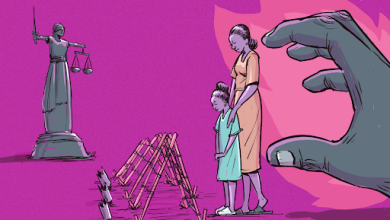‘Boko Haram Abducted My Son, Yet Soldiers Detain My Husband As Terror Suspect’
While stakeholders in Borno, Northeast Nigeria, have agreed to pardon and accommodate Boko Haram members who recently surrendered, it is unclear if a similar gesture will be extended to wrongfully detained people like Maryam’s husband who have insisted on their innocence.

Maryam Muhammed, a 31-year-old mother of six, says the Boko Haram conflict has robbed her of the things she values most. Her husband, Muhammed Abbas, has been kept in military custody for over six years now. He was arrested and detained for alleged complicity in the activities of Boko Haram insurgents.
Shortly before Muhammed’s arrest, her eldest son, who should be about 15 years old now, was abducted by the terror group when it attacked their community, Boboshe, a village in Dikwa Local Government Area (LGA), Northeast Nigeria.
“My son, Bukar, was abducted when Boko Haram invaded our community, forcing people especially the men and young boys to join them,” she said.
“My husband and my eldest son who was about ten years old then escaped through the backyard of our home and began to run for their lives. But my son could not run fast and Boko Haram caught up with him and took him away, while his father made it to Maiduguri.”
Maryam and her other five children later relocated to join her husband in Maiduguri, where they got some accommodation at a camp for Internally Displaced Persons (IDPs).
There was hunger in the camp because no organised provision for food palliative existed at the time. So, some men would have to risk their lives by travelling to farms earlier abandoned in Dikwa to harvest some produce.
The last time Maryam set eyes on her husband was when he left with six of his friends on one of these trips to Dikwa. “He never returned because, as we later got to know, soldiers arrested them on the way to Dikwa and accused them of being members of Boko Haram,” she said amid tears.
“My husband pleaded with them that he was never a member of Boko Haram; that he had to flee from his village in Dikwa when Boko Haram wanted to kill him, but the soldiers refused to listen to them.”
Maryam said she and many other women whose husbands were arrested similarly traced their spouses to the Giwa military barracks in Maiduguri, but no one could help them to convince the Nigerian Army that they had nothing to do with Boko Haram.
“They were kept in the detention centre for a year and a half before he was moved to somewhere near Maimalari barracks. We later learnt that one of the friends was later freed to return home, while another of his friends was reported to have died in detention.”
“No wife is ignorant of what her husband does. If my husband was Boko Haram, I would have known because all women whose husbands are Boko Haram are aware of that, and none of them dares to go looking for their husbands the moment they are arrested because they know their husband was caught in the act. But I know my husband — so do other women who usually frequent the barracks to check on their detained spouses.”
Now moved from the IDP camp where she and her kids had been living to one of the low-profile relocation housing estates recently built by the Borno state government, Maryam says she and her five children face a hopeless future.
“We thank God that we have been given a room in a compound we share with a widow,” she said. “Now the future and the hope of seeing my husband and son get bleaker by the day. My children are growing and I fear for what will happen by the time they outgrow my powers of fending for them. I am so worried; that is why I cry every day for my dear husband and my eldest son.”
Having been moved from the camps to the new relocation home, she fears for what will become of their welfare because the food ration they currently receive is inadequate to feed them for a month. “Each child is given a measure of grains, and that hardly lasts for over a week. That is why I seriously miss my husband and cry every day for him to be released,” she said.
The state government recently held a public town hall meeting where top stakeholders agreed to pardon the thousands of Boko Haram insurgents streaming out of the jungles to surrender to the Nigerian troops.
It is not clear if the same amnesty would be extended to those still in military custody on alleged but yet-to-be-substantiated claims that they have links with the insurgent group.
Support Our Journalism
There are millions of ordinary people affected by conflict in Africa whose stories are missing in the mainstream media. HumAngle is determined to tell those challenging and under-reported stories, hoping that the people impacted by these conflicts will find the safety and security they deserve.
To ensure that we continue to provide public service coverage, we have a small favour to ask you. We want you to be part of our journalistic endeavour by contributing a token to us.
Your donation will further promote a robust, free, and independent media.
Donate HereStay Closer To The Stories That Matter




